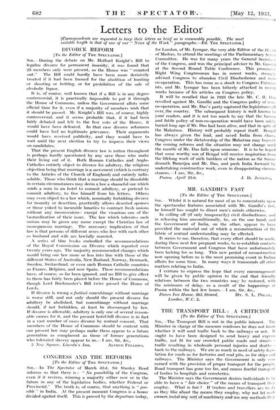Letters to the Editor
[Correspondents are requested lo keep their loiters as brief as is reasonably possible. The most .
suitable length is that of one of our News of the. Week- paragraphs.—Ed. THE SPECTATOR.]
DIVORCE REFORM
[To the Editor of THE SPECTATOR.]
Sia,—During the debate on Mr. Holford Knight's Bill to ' legalize divorce for permanent insanity; it was found that 23 members only were present, so the House was "counted out." The Bill could hardly have been more derisively treated if it had been framed for the abolition of hunting or shooting or betting, or for prohibition of the sale of • alcoholic liquor.
It is, of course, well known that if a Bill is in any degree- controversial, it is practically impossible to put it through the House of Commons, unless the Government allots some' official time for it, even if a majority of members wish that it should be passed. Mr. Knight's Bill was, of course, highly controversial, and it seems probable that, if it had been fairly debated and left to the free vote of the House, it' would have been defeated. In that case divorce reformers could have had no legitimate grievance. Their arguments would have received publicity, and they would have to wait until the next election to' try to impress their views on candidates.
That the present English divorce law is rotten throughout is perhaps hardly questioned by any save those who make their living out of it. Both Roman Catholics and Anglo- Catholics entirely object to divorce for adultery, the religious objection being that marriage is a sacrament (which is contrary to the Article's of the Church of England) and entirely indis- soluble. Those who think that a marriage should be dissoluble in certain circumstances may deem a law a shameful one which sends a man to an hotel to Commit adultery, or pretend to commit adultery, to free himself from his fetters. Others may even object to a law which, nominally forbidding divorce for insanity or desertion, practically allows deserted spouses or those yoked to incurable lunatics to contract fresh unions. without any inconvenience except . the vicarious one of the bastardization of their issue: The law which tolerates such unions may be given any name except the Christian law of monogamous marriage. The necessary implication of that law is that persons of different sexes who live with each other as husband and wife are lawfully married.
A series of blue books embodied the recommendations of the Royal Commission on Divorce which reported over twenty years ago. The majority recommended changes which would bring our law more or less into line with those of the different States of' Australia, New Zealand, Norway, Denmark, Sweden, Switzerland, or even such Roman Catholic countries as France, Belgium, and now Spain. These recommendations have, of course, so far been ignored, and no Bill to give effect to them has fairly been placed before the House of Commons, though Lord Buekmaster's Bill twice passed the House of Lords.
If divorce is wrong a fortiori concubinage without marriage is worse still, -and not only should the present divorce for adultery be abolished, but concubinage without marriage should, if not forbidden, at least be discouraged by law. If divorce is allowable, adultery is only one of several reason- able causes for it, and the present hotel-bill divorce is in fact in a vast number of cases divorce by mutual consent. That members of the House of Commons should be content with our present law may perhaps make them appear to a future generation as complacent as those of former generations who tolerated slavery appear to us.—I am, Sir, ttc., 5 New Square, Lincoln's Inn.. ALFRED FELLOWS.
































 Previous page
Previous page